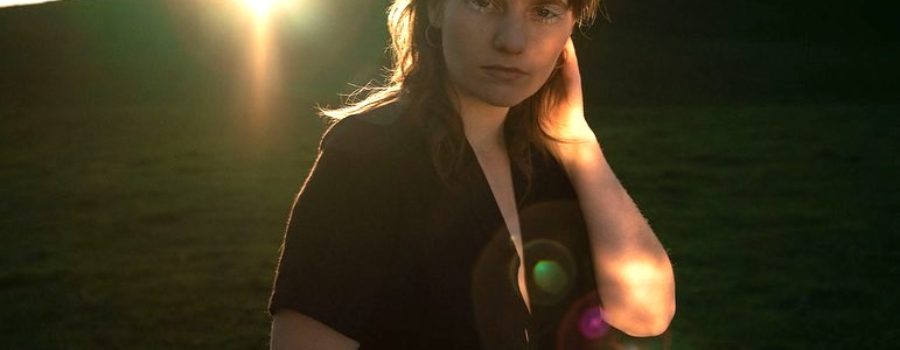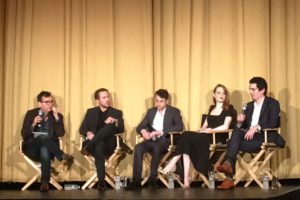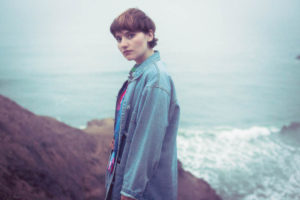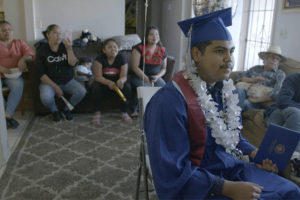[Published at 48 Hills] Chloe Zelma Studebaker, the frontperson of San Francisco indie band Zelma Stone, is wise beyond her years, as evidenced in new EP “The Best,” which debuted August 20.
“I spent a lot of this year learning to trust myself and embrace new chapters,” Studebaker says in a press statement accompanying the EP. “The theme of moving forward and accepting change is very present throughout this record, and it was exciting exploring these ideas with a fuller sound and more dramatic dynamics.”
Zelma Stone’s previous EP “Dreamland” is a surreal, sauntering five-track examination of the fleeting nature of life. But “The Best” climbs that mountain of grief, processing a more metaphysical, yet positive, outlook. The singer-songwriter, guitarist, and keys player began composing at age 14 after losing her 19-year-old brother and mentor Brett in a car accident. Throughout the following decade, Studebaker would lose her mother, grandfather, and finally, close friend Jenny in the Ghost Ship warehouse fire in Oakland.
Studebaker describes the new EP as “the latter half of my grief process,” and she and her Zelma Stone bandmates amalgamize this trauma elegantly, manufacturing an effervescently ethereal, at times soul-stirring meditation on the human condition.
Ahead of the live debut of “The Best” at the Chapel on September 9, I had a chance to speak with Studebaker about the new EP, grief, inspiration, music videos, and what we can expect at the Chapel.
48HILLS On your website, you mention that your “lyrics often materialize subconsciously, and the underlying meaning does not always come to me right away,” and that, “Sometimes even months or years later, the meaning takes on a new form.” Do you still absorb new meaning from your tracks when listening to them?
CHLOE ZELMA STUDEBAKER Yeah, definitely. I do. Sometimes, I’ll write a song and I genuinely don’t know what the meaning is. I always find new meanings when I’m singing and re-listening to all our songs.
48H I listened to your EP several times, and each time, I get something new out of it, whether it’s a lyric, or an instrumental, or a musical riff. Who plays the background instruments on this new album?
CZS I sing and then I play rhythm guitar, and then I played a little bit of keys and synth, but mostly the keys and synth were Maryam Qudus, who also produced the record. And then my friend, Rob Shelton, who plays with Meernaa, played some keys on it as well. My band that I play most with right now played on it—so Jodi Durst played bass, Tyler English played guitar and pedal steel, and then my partner, Craig, plays drums and he sings some backup vocals as well.

48H Although grief still lingers throughout “The Best,” it’s a decidedly more optimistic EP than “Dreamland.” The theme of moving forward and accepting change is very present throughout this record. What influenced this change of outlook in your songwriting?
CZS Just wanting to exact a more positive outlook, and it’s the latter half of my grief process, where, thinking years later, it’s a lot about how am I going to move forward from here now that I am the person I am with the grief that I’ve experienced, and reminding myself that I’m doing the best I can and just continuing on my path.
48H That’s a great way to put it. With “Gift Horse,” the saying really is about not finding fault in favors, or gifts, or opportunities, to put it literally. But it’s almost a self-compassionate warning to yourself, in this bright future you lay out in the song.
CZS That’s pretty much correct. Just not feeling ungrateful, and maybe finding the good in what’s being brought to you—what might not seem good, but kind of having trust in what is. And that’s an example of me finding meaning in my songs later on. I wrote that at a time where it made the most sense, but it makes a lot of sense in where I am now also.
48H One of the lines I really enjoyed on another EP, “Layla,” is, “Got enough water to put out this hellhole, but I won’t because I’m alright.” And on your website about “Money Honey,” it says, “It could be a promise or a white flag waved in defeat.” And I saw it as both. The white flag isn’t always a negative conceit. It could really be about relinquishing control, which is a big theme throughout that EP.
CZS I’d say so. “Money Honey” reminds me of my mom. My mom had this energy to her, where sometimes you feel this tough love. And I’d be making a big deal out of something small, and she’d say, “You’re fine.” When she was passing away, I asked her, “What am I supposed to?” out of desperation, because I relied so much on her advice. And she was just looked at me, and she’s like, “You’re wise.” So it’s very much just me faking-till-I-make-it and just embodying the fact that I’m OK and that I am wise and that I have the capability to do this on my own, and it’s all inside me.
48H And I love that image of the money being gracefully thrown at you in the air while you’re singing in the video.
CZS It’s funny how graceful it looked because it’s all in slow motion, but it was actually really stressful being in that machine. There were a couple of times where the money got really close to my eyeball. And you could actually see it there in the music video where it hits me, but I just kept going. So it’s funny that it looks so graceful because it was actually pretty intense.

48H Maybe it’s because I hear him in so many songs, but has Elliott Smith had an influence on you at all?
CZS I think so. A lot of artists that I really admire often say that they are inspired by Elliott Smith. And since then I’ve gotten into Elliott Smith, and I love the way how he uses double vocals a lot. I really like that sound.
48H And particularly the muffled and almost snarling, yet yearning electric guitar evokes Smith in a lot of your tracks. And there are extended sort of codas which repeat important lines and reiterate common motifs on this record, particularly in “Come Back” and “The Best.” Where did you sort of get this idea of closing out a song this way?
CZS Actually, sometimes I’ll write a song, and I’ll come up with multiple parts of the song, and then I’ll put it together afterwards. I love the idea of leaving the best for last. The thing that’s going to stick with you throughout the day usually is the last thing you hear. And so I love the idea of the melody that hits me the strongest was like, “Put it at the end of the song and just write it out.” And the phrase that hits you the strongest in the song, “The Best.” “We all are just doing the best we can”—it’s just a really cool reminder. And that’s why I wanted it to be the last song and the last thing people hear. I love codas.
48H “Come Back” can be about losing a significant other. But I also couldn’t help but think about your brother Brett as well. Looking back, what does this song evoke in you compared to when you wrote it and what you think of it now?
CZS “Come Back” definitely talks about my thinking of death, in a way. I’ve had a lot of trauma from the death that I’ve experienced in my life. And I wrote the song at the beginning of a relationship, and because of all the loss that I had experienced, I tend to cling more to the things that I have and love that come my way these days. The fear that they will also die comes up a lot, unfortunately.
And that’s what this song is relating to. I wrote it when my partner was out at a gig and I was having all these intrusive thoughts of like, “Ah, where are they? Did they die? Are they OK?” It is this call to a loved one, just come back. So in a way, it is like talking to my brother, talking to my mom, “Come back. I’ve been waiting for you. Come back home,” this desperation of wanting them to still be here.
48H There’s an air of vulnerability to this EP, especially in “You’re Now 2.” You’re listing your fears. You’re telling yourself, “What have you gotten yourself into?” And it feels like a love song, but approached from a more honest place than a lot of others of its kind.
CZS I see that one as a love song. When I talk about that song when I play it live, I’ll definitely say it’s a love song, and I haven’t really written any love songs until this record, which is an interesting difference, I’d say, with the last record. In a way, all of my songs are love songs to family members or people who have passed. But this is specifically a love song to a significant other, and it definitely creates a realness, and it’s not all easy. Relationships are not easy to manage and to keep going. And in some ways, it just reflects on how I am in relationships. I’m just kind of like, “You’re stuck with me.”
48H I love the controlled emotional outburst in that song at the end. That must have been fun to explore.
CZS I like the dynamics in the song. I’m really happy about because it just reminds you of an actual relationship. It can be really intense, but even when it gets very intense, you still have to have some sense of control. So I like how you said controlled chaos, in a way.

48H In “Sea of Diamonds,” Jodi Durst’s basslines are so satisfying. In the song, the ground moving beneath you and the cherry blossom can represent the impermanence of life. In this EP, you take that impermanence by the horns and conquer it.
CZS I have this memory. I was probably 17 when I wrote this song. But I remember being in my room and the lyrics cherry blossoms came out. And I just could not figure out why am I saying this, but for some reason it makes sense to me, and I’m going to write it down, and it’s going to stick. And it ended up sticking. And there’s never any intention like, “Oh, I want to put cherry blossom in this,” or like, “I collect cherry blossoms and that’s why I’m going to write this down.”
I’ve never done my research on what cherry blossoms even represent, and I’m very curious now because I would love to dive deeper in that and where that might have subconsciously came up. We did have a family vacation where we went to Japan when I was like 13, and that was a memory that I hold very dear to my heart, and cherry blossoms definitely remind me of Japan, and so that could be where it kind of came from.
48H It’s also a major theme in Buddhism as well, the cherry blossom. The eponymous track, “The Best,” exclaims, “We’re all just doing our best,” paired with you asking what can life and those in it offer you. They both seem contradictory as well as harmonious with the human condition, representing our duality. It wraps up the EP well.
CZS Right. With “The Best,” it does wrap it up for me, and also when it relates to grief, it’s relating to my relationship now with the loved ones that have passed, and moving forward from there and with the relationship that I have with them now. And I am a big believer in that they’re still around and that they’re still guiding me and helping me. And so there’s a line in there like, “What can you offer me?” But then it says another time, “How can you help her help me?” How are you going to help my mom, for example, help me right now?
And it’s just this constant battle, wondering if they’re actually there helping me. When you get into it, when you get really deep, when it gets really low and sad and you go with stuff that maybe they’re not there, that hits that part of me—wondering if they’re really there. But then it’s really just trusting that they’re there. That’s the best you can do is just trust that they’re there with you and then what you can do from there is just continue to do the best you can. And that’s what my mom always taught me.
48H The Chapel show coming up on September 9 is where you’re going to debut the live version of “The Best.” What can people expect from that show?
CZS I’m very excited, I’ll have my full band, and I get to play with the French Cassettes. They’re an amazing local band and have been around for so long. And then Andrew St. James, who does so much for the music community here in San Francisco, putting on shows, and just a great person in general. It’s just a very exciting show, and the fact that I’m playing at The Chapel for the first time is huge for me. I’ve played a show since being back from the pandemic, and since everything’s been open, but this is the first one with the band. So definitely a bit nervous but excited. And I just hope that people come and really enjoy it. And we should have merch ready for people. We won’t have this on vinyl this time, but there will be CDs. I’m hoping that people have a car that allows them to play it or at least can find a friend to go on a ride with.
More info about “The Best” here. Zelma Stone plays with Andrew St. James and French Cassettes, September 9, 8pm, $16 advance. The Chapel, SF. More info and tickets here.








Leave a Reply
Your email is safe with us.